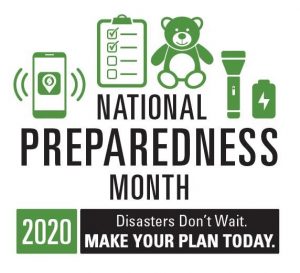Last Updated: September 21, 2020
Are you Prepared?
Disasters and emergencies can come in many forms and at any time. It’s important for you to be prepared for such events. September has been designated as National Preparedness Month. Take this month to do the following:
Prepare Your Health
In the midst of the COVID-19 pandemic, it is important to maintain childhood immunization when possible. These vaccinations protect your children from vaccine-preventable diseases. Vaccination throughout childhood is essential because it helps provide immunity to children who may be exposed to life-threatening diseases. Vaccination is the best protection. You have the power to protect yourself and your family against vaccine-preventable diseases.
- To find out what vaccination your child needs for protection, use the Childhood Vaccine Assessment Tool or go to cdc.gov/vaccines/parents/by-age/index.html and click on your child’s age.
- View the Schedule of School Vaccinations for Children.
For more information on vaccinations and immunizations visit www.vdh.virginia.gov/immunization/ and www.cdc.gov/vaccines/parents/index.html.
Prepare for Disasters
Limit the impacts that disasters have on you and your family. Know the risk of disasters in your area and check your insurance coverage. Learn how to make your home stronger in the face of storms and other common hazards and act fast if you receive a local warning or alert.
- Take steps in your home to protect your family and your property from accidents and common hazards:
- Install smoke alarms on every level of your home, test them monthly, and replace them when they are 10 years old.
- Protect your family by installing a carbon monoxide detector.
- Have chimneys and vents cleaned and inspected by a qualified professional at least once a year to prevent home fires.
- Keep anything that can burn at least three feet from your furnace, water heater, and other heat-generating equipment.
- Do you know how to turn off the gas in your home? Learn how to turn off utilities like natural gas in case you ever have a gas emergency in your home.
- Practice responding to various disasters – like earthquakes: drop onto your hands and knees. Cover your head and neck with your arms. Hold on to any sturdy covering until the shaking stops.
- Learn basic First Aid, CPR and Fire Safety skills. More information is available at ready.gov/safety-skills.
- Life-threatening emergencies can happen fast and emergency responders aren’t always nearby. You may be able to save a life by taking simple actions immediately. Learn more at https://community.fema.gov/until-help-arrives.
Teach Youth About Preparedness
Preparing for emergencies shouldn’t fall on your shoulders alone. Young children and teens alike need to be part of the process — for their own safety and sense of empowerment.
- Work together to build an emergency kit.
- Sit down as a family to talk about your communications plan.
- Role-play what you would do during a disaster.
- Hold fire drills in your house.
Helping Children Cope: Not all children deal with emergencies and disasters the same. See these additional resources to help your child navigate through the crisis of emergencies and disasters.
Disaster Preparedness Activity Book
Prepare with Pedro is a joint product of FEMA and the American Red Cross. The Prepare with Pedro: Disaster Preparedness Activity Book is designed to teach young children and their families about how to stay safe during disasters and emergencies. The book follows Pedro around the United States and offers safety advice through crosswords, coloring pages, matching games, and more.

